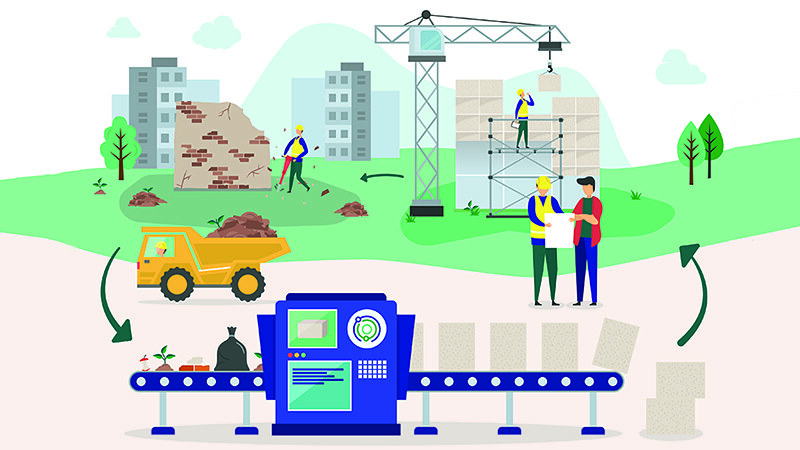Budget
€6.9 Million
Project status
In progress
Duration
1 Mar 2019 to 30 Sep 2022
€6.9 Million
In progress
1 Mar 2019 to 30 Sep 2022

The EU-funded project Circular Bio-based Construction Industry (CBCI) focuses on more efficient use of raw materials in construction. This will help reduce carbon emissions during the entire life cycle of a building. At the heart of this project is the development of a comprehensive approach to circular and bio-based construction that the construction industry can build upon in the transition to a circular economy.
Play our animation explaining how we plan to provide practical solutions to speed up the uptake of circular bio-based construction.
A major consumer of materials, the construction industry accounts for approximately 33% of all carbon emissions. The components and materials currently in use often cannot be adapted, reused or recycled during or after their lifecycle. This is mainly due to the current linear approach to designing and the construction processes. Also, the majority is not made of renewable, bio-based materials. The industry needs to move away from its current ‘linear’ approach and embrace bio-based, circular construction.

Circular and bio-based construction demands an integral approach, which in turn requires an evaluation and possible changes in processes, new technical applications, (other) business models, and rules and regulations. As a consequence, the current roles of stakeholders in the construction industry need to be adapted and new roles will arise. Within the CBCI project we develop an approach that ensures coherence between technical, legal and social aspects as well as business models for bio-based and circular design and construction. In doing so, we aim for the widest possible application in practice.
Within the CBCI project, we ensure an effective learning experience and knowledge-sharing by capturing and analysing all the stages in the development processes, for example through workshops, prototyping, living labs and real-life case-studies.
Two real-life construction projects are at the heart of the CBCI project and are the so-called living labs. The first living lab is the extension of the mental healthcare clinic from the organisation Emergis in the province of Zeeland. The second one is a newly built centre for the KU Leuven university campus in Ghent, Belgium. Since the start of the project, crucial choices have been made with regard to the tendering for the living labs. For project partner Emergis (NL) Design & Build tender was chosen for the total renovation and new construction, whereas project partner KU Leuven (BE) has chosen Design & Build only for the structure and skin while lease is chosen for the plug-in modules for the HVAC systems plus the sanitary and technical installations. Through co-creation the CBCI team and the selected contractors will further elaborate the design and material choices.
We are teaming up with stakeholders and experts to develop façade elements that are not only tested in the lab as prototypes but are also actually used within the Living labs. Designing, testing and producing of the prototypes is taking place in labs in Belgium (BBRI), the Netherlands (SPARK Maker Space Lab) and the UK (Centre for Innovative Construction Materials). These facilities allow our researchers to use the latest production techniques and research facilities. Materials that have been included in the first rounds of testing, are for example sheep wool, timber, nabasco, metisse and grass.
Project outputs will include various publications, short films, a practical guide and a feasibility study. All of these will provide current and future professionals in the construction sector with inspiration and practical information they can use in every stage of their construction projects.
The learning outcomes of the project and the materials developed will ultimately come together in an exhibition organised at Kamp C in Westerlo, Belgium and in a mobile exhibition that will travel to several locations. In order to preserve the learnings of the project for the long term, efforts are also being made to provide a practical guide and supporting teaching materials for professionals and students.
Our first project publication identifies the five essentials: affordable, flexible, passive, integral, and traditional ownership. This practical white paper is freely available for download in English, Dutch and French via the HBO-Kennisbank.
This white paper reports the procurement and tendering experiences of circular bio-based front-runners and development of our CBCI living labs. It is freely available to download in English, French or Dutch
This white paper was published in the context of the Interreg 2seas project on the Circular Bio-based Construction Industry (CBCI). It was written because producers, contractors, building owners and developers often believe that legislation and regulations prevent the wider application of circular bio-based construction.
But is this really the case? In this white paper we discuss:
Fill out a form to download the free white paper in English, Dutch or French.
The Univeristy of Bath is collaborating with nine knowledge-based institutions and organisations:
Our design research approach is characterised by an iterative approach and the involvement of a broad range of stakeholders and experts. We organise workshops and meetings to learn about all the different perspectives and aim to involve project stakeholders through different means and channels. You can register for the CBCI newsletter to stay informed about all CBCI activities. Would you like to be more involved in this project and get to know how you can contribute? Please do contact the project team via info.CBCI@avans.nl or directly via one of the project partners.
The entire project is set to run for almost 4 years, i.e. until 30 September 2022. Its budget adds up to nearly €7 million. CBCI is an Interreg 2 Seas 2014-2020 project. Interreg 2 Seas is a European Territorial Cooperation programme. The European Regional Development Fund (ERDF) financially supports CBCI.
The team comprises various members of the BRE CICM in the Department of Architecture & Civil Engineering
If you have any questions about the project, please get in touch.